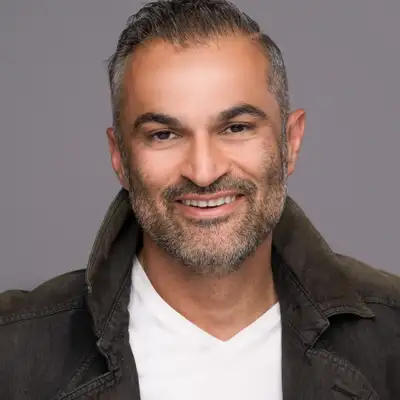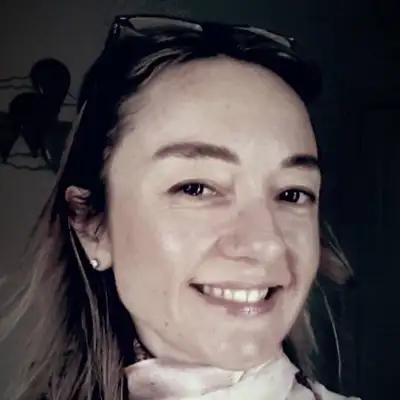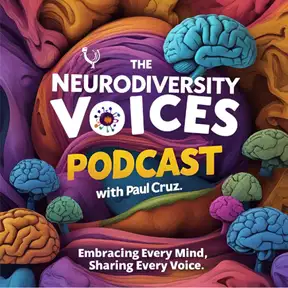Exploring the Autism Cascade Hypothesis with Scientist Sinem Berthier
Download MP3Hello and welcome to the Neurodiversity Voices podcast. I'm your host, Paul Cruz, and I'm thrilled to have you join me on this journey of exploration, advocacy, and celebration of neurodiversity.
Gino Akbari:And I'm Gino Akbari. Together, we'll have meaningful conversations, share inspiring stories, and challenge misconceptions about neurodiversity.
Paul Cruz:This podcast is for everyone, whether you're neurodivergent yourself, an educator, a parent, or just someone curious to learn more. We aim to amplify voices, foster understanding and spark change in how we view and support neurodiversity.
Gino Akbari:We're so excited to have you as we celebrate the beauty of diverse minds and work toward a more inclusive future.
Paul Cruz:So sit back, relax and let's get Today, we're thrilled to introduce Sinam Berthier, a scientist with a background in chemistry and training in pharmacology, genetics, and biochemistry. After working in pharmaceutical marketing, she followed her curiosity and personal experiences into researching autism, child development, and the powerful the brain. She's lived and worked across Istanbul, New York, Germany, and now Leon, bringing a rich cross cultural lens to her research and community workshops. And here's what makes this conversation special. She's blending deep science with real life parenting and changing how we think about early development.
Paul Cruz:If you've ever wondered how tiny choices in a child's earliest days can shape their future, you're in the right place. Let's dive in. Sinam, welcome to the podcast.
Sinem Berthier:Hello. Thank you. Thanks for having me.
Gino Akbari:We're so delighted to have you here. Your journey from Istanbul to New York, Germany, and now Lyon is remarkable. And it's inspiring how you've woven your scientific expertise with your own experiences as a parent to reimagine how we approach autism and child development. I mean, we can't wait to dive into your story. So what first drew you from your background in chemistry and pharmaceuticals into researching autism and child development?
Sinem Berthier:I come from a background of chemistry and pharmaceuticals. My journey doesn't end here. So when I became a parent, when I became a mother, I lived in a very difficult experience because of my child getting diagnosed with the autism symptoms. That was the turning point where I decided to dive in and this is where I am today with my hypothesis paper and I'm into independent research.
Paul Cruz:You've lived in Istanbul, New York, Germany, and now Lyon. How have those moves shaped your outlook on science and community?
Sinem Berthier:Well, it's actually very nice to see all these differences and different beliefs and perspectives into health. I can give you an example, like neurodiversity can be embraced in one culture and may not be embraced in another culture, may be seen as a disease or may be looked down upon, not be respected. So it gives you a perspective that you can have a distance to all these beliefs in acceptations of the new ideas as well. And The US and Europe, they are very different to new ideas. I believe that it's a cultural thing, not a personal thing.
Gino Akbari:So what lessons or skills helped you make the leap from pharmaceutical marketing to independent research?
Sinem Berthier:For the skills, I would say I come from a marketing in pharmaceuticals and within my department I worked, I had to work with a lot of physicians, with a lot of medical advisors and I need to learn to speak their language to really be formally trained in order to have a meaningful conversation with them. But independent research, I would say it's mostly intuition. And where I stand today is interdisciplinary. Because if I were working for an institute, I would be limited by the expectations of the institution and I would be specialized in a certain topic. Whereas in this case, in my case of autism, it lies interdisciplinary.
Sinem Berthier:So it's between the disciplines. So you need to have some sort of a distance from all the disciplines to be able to see a meaningful picture. So I would say, I would not say is it a skill, but it was a nice position to be at for me.
Paul Cruz:Could you walk us through the autism cascade hypothesis in family friendly terms?
Sinem Berthier:Of course. In my hypothesis, the cascade, first I defined the risk groups. The risk groups are if the mother is about the age of 35, has given birth in vaginal birth but a C section and was not able to and could not breastfeed and therefore the baby had to get the formula milk, that's mainly cow milk. Mother, either the mother or the baby had to use antibiotics early on within the first month of delivery and no skin to skin contact, so sterile environment. So these are the risky and this is the group I would define as risky group.
Sinem Berthier:And with this risky group there is a problem with the digestion of the babies. When they consume the cow milk which the formula milk, they have a problem with digestion and the digestion is not merely what we see today, very popular terms of lactose and not lactose. It's not about the lactose, it's about the protein of the milk, which is called casing. So the casing has got two types, A1 and in today's formula and milk, there is mostly A1 type of milk, which if it's poorly digested, there is a side product of this digestion process we would call it BCM7. BCM7 is the beginning of this biological domino, so the cascade.
Sinem Berthier:So BCM7 crosses the barriers in the baby, I would say. The barriers are the first barrier is the gut barrier, which is BCM7 is from the gut is absorbed directly into the blood circulation. And the second barrier is the blood brain barrier, which is the barrier actually that protects the brain. So BCM7 disrupts both barriers. And when the blood brain barrier is disrupted, we add to this cascade the vaccination timing in this very vulnerable window.
Sinem Berthier:So I would say in the first year or minimum the first six months is very, very critical. So in the maturation of these barriers, as well as in these risky groups, these two barriers are disrupted. So we're having a full blown autism here in this according to my hypothesis paper. I just want to add a little note to this which is very important. So my hypothesis is not really covering the, I would say, is related to the rise in the number of autism cases that we have looked from the year 2000 and on.
Sinem Berthier:So there was autism before 2000s but not very very frequent as of today. So this hypothesis is based on the environmental factors and how they play in forming an autism case. So this is important to note.
Gino Akbari:Yeah. I'm gonna so so what let me what you're saying is that I'm an outsider in all of this. So I'm gonna ask you a question as an outsider learning about all this. So autism could be environmental or genetic. Is that true or false?
Sinem Berthier:It's both. It's both. So today, we are not able to prove that it's completely genetical, but I was suspicious this recent rise, this sudden rise in thirty years of time cannot be genetical. So there is a genetic part of autism or the autism that we see before that we have seen before the year 2000 was probably not really related to much of the environmental factors as of today. This recent rise is very suspicious.
Sinem Berthier:That was the key point which made me dive into all these studies, really. So I didn't want to settle in because I was really suspicious of this.
Gino Akbari:So what practical steps in the first months of life might support healthier developmental outcomes?
Sinem Berthier:Yeah. That's a very important question. And this, of course, actually, they're not very difficult. So if we're talking about if the child is in this risk proof, what can the parents do? Two things.
Sinem Berthier:They can take probiotics themselves if the mother is breastfeeding or the baby there can take probiotics. It's important to which probiotic actually. Usually we recommend as scientists a single strain probiotics, not a really cocktail type of probiotic mixture. But single strain bacteria, they are more effective and they are more suitable for the babies, for the infants. And the second thing for the pediatricians actually, if they can delay the vaccination timing, at least maybe they start the first vaccine when the baby is seven months old as opposed to when the baby is two months old or three months old.
Sinem Berthier:So these two things, they are key, very important.
Paul Cruz:What common misconceptions about autism do you most want to address?
Sinem Berthier:That autism is always congenital and always irreversible. That belief is completely powerless. So I believe that there are some cases, there may be some cases, which is not congenital and which may be reversible.
Gino Akbari:That is incredibly amazing to hear. I haven't heard that before, but I do, in my own beliefs, believe that there's always a solution, but that we are just a tiny step away from the right antidote to come up with those solutions. And hence why we have people like you doing this kind of research. So how do you make your work understandable and useful for families without oversimplifying it?
Sinem Berthier:Well, I try to use less scientific words, and that's first of all. And the second thing is that I explain my story because it's the stories that count for people, for parents. So it's not just to use academical terms because I'm not into this for only academic curiosity. Stories are important for parents, I think.
Paul Cruz:What inspired your Le Famanti project on fermented foods and microbiome health?
Sinem Berthier:Le Famanti is actually an initiative I have just started. It's at the baby stages. This is related to my independent research project as well. With Le Fermentis, I'm creating workshops where we can implement fermented foods in our everyday culinary habits, which is what we have forgotten actually. So my I'm coming from Istanbul.
Sinem Berthier:So in in our Turkish cuisine, we have many recipes with fermented foods, which I haven't seen in US and Europe, not really very much except for the delicious wine and the cheese in France, of course. But for the children, the children can also benefit from this fermented foods and it's important for their immune system as well. It's not only for we are talking about autism, but the importance of fermented foods in our daily life is crucial to how the immune system is working properly. So this is somehow forgotten. We're always bombarded with messages that we need to eat a healthy food, fresh fruits and vegetables, but also fermented fruits and fermented vegetables, they are also a big part in our everyday life.
Sinem Berthier:So the fermenter's mission is just to reintroduce the things that we have forgotten.
Gino Akbari:When designing bilingual culturally inclusive workshops, what challenges and opportunities have you found?
Sinem Berthier:That's also a good question because when you say bilingual, it's also bicultural, it's multicultural. Because there are some beliefs that they say the bacteria, for example, the term bacteria is bad. It has got a very bad connotation. So we are used to infections. Bacteria means infection.
Sinem Berthier:It means antibiotic. It means we need to kill it. But there is good bacteria in fermented foods that we need, and our health depends on it, for example. So this is a negative cognition that it's a cultural belief that it's not good. And for example, if something smells bad, we should not eat it.
Sinem Berthier:But there is a cheese in France that smells not so good, but it's it's good to eat it, for example. So it's really changing from one culture to another. It's important to keep the healthy distance and to keep the curiosity to discover.
Paul Cruz:What does real empowerment look like for families navigating autism concerns?
Sinem Berthier:This is also very important because I was one of those parents a couple of years ago. The first time I remember very well when I, like every parent, I Googled this situation, it was I was hopeless because all I could see was there is no real cause, real known cause, and therefore there is no treatment. So this was really a nightmare for me. So with this hypothesis, I would like to empower the parents that some of the autism cases may be reversible and to give them the tools to let this cascade happen in the first place. This is also for the pediatricians as well.
Sinem Berthier:It's the parents and the pediatricians, they are the key groups that I would like to have access to.
Gino Akbari:Which areas of neuroimmunomicrobium research excite you most right now?
Sinem Berthier:Right now, what I'm interested in is actually there is an enzyme that's playing a key role in the cascade of autism, but also it plays a key role in immune system, which is called DPP4. And DPP4's role in the immune system is not very well known. This is kind of overlooked and it is possible that DPP-four is playing a big role in child cancers as well. This is an area I'm interested in to really dig into the functions of DPP-four in our system.
Paul Cruz:And finally, Senem, what legacy do you hope your work leaves for families, pediatricians and the neurodiversity community?
Sinem Berthier:Yeah, that's a beautiful question as well. So I would like to empower the parents with hope, with the real hope, scientific hope, and pediatricians to give them the tools that they can reverse things from the very start where they have all the opportunity and the neurodiversity, their divergent community with respect.
Gino Akbari:Sanem, thank you so much for sharing your journey with us today.
Sinem Berthier:You're welcome.
Gino Akbari:Yeah, absolutely. The way you blend deep science, cultural insight and personal experience is truly powerful. And it gives so much hope to families who are navigating these early stages. It's been an absolute honor and pleasure having you on the podcast. Thank you.
Sinem Berthier:Thank you.
Paul Cruz:Thank you, Sinem. To our listeners, please share this episode if this conversation resonated with you. Don't forget to subscribe to the Neurodiversity Voices podcast wherever you get your podcasts, and even rate our podcast on your favorite podcast app.
Gino Akbari:If you have any questions, ideas or stories you'd like to share, please feel free to write us or sign up to be a guest on our website at www.neurodiversityvoices.com. We'd love to hear from you.
Paul Cruz:Till next time. Take care, stay curious, and keep celebrating the beauty of diverse minds.
Gino Akbari:Thanks for listening to the neurodiversity voices podcast.
Creators and Guests



